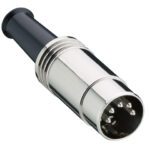The Value of Industry Standard Compliance
By Alexander Weber, Global Product Manager, Belden Inc.
Fact: Mission-critical applications require industrial networking components that meet the highest levels of industry standards to withstand harsh environmental conditions. Failure to meet this threshold is likely to result in higher levels of interference and longer periods of downtime.

With this in mind, selecting products with industry approvals offers teams many benefits, including:
- Greater electrical, mechanical, and functional safety
- Improved fire protection and better flame-retardant properties
- Special protection for specific or unique application scenarios
- Maximized uptime and limited interference
- Standardization within the market
- Reduced total cost of ownership (TCO) through choosing components that stand the test of time
The unfortunate reality is that even when an original design calls for components that meet these standards, they aren’t always used. This disconnect happens because the requirements enforced by regulatory authorities don’t always match those of the actual application.
Take, for example, the Underwriters Laboratories standard UL 2238 for cable assemblies and fittings for industrial control and signal distribution. These UL requirements were adapted to address new safety needs that weren’t being met by older versions, such as UL 1977. Even though the market need for greater safety measures warranted the new requirement, this shift had a considerable impact on all valve connector manufacturers. Their previous production strategy was focused on meeting now-outdated standards, and they were forced to make moves to keep up with the times.
None of the valve connectors manufactured prior to the introduction of the UL 2238 standard in February 2015 meet the new technical requirements. As a result, valve connector manufacturers have been forced to develop new products, which has impacted businesses trying to both meet the new industry standards as well as maximize operational efficiency. This also impacts the market for hydraulic valves and the machine-building industry. If expensive equipment can’t be used in certain areas due to a lack of connector approvals, substantial problems result, such as the entire loss of machine approvals and problems with product liability in case of accident.
New Standards Require New Materials
Due to the UL 2238 standard, valve connectors now require different materials, housing, and fittings. The following requirements should now be adopted per the existing hydraulic valve standard:
- Impact resistance of seven joules, roughly equivalent to a hammer stroke, with adequate protection for conductive parts that are not allowed to be touched even if the housing cracks
- Fire resistance per UL 94 5VA, which mandates flame and gas-retardant efficacy to prevent the product from becoming a fire accelerant
- Resistance to temperature-change cycles spanning -40°C to +90°C, which reenact an extreme-climate scenario to increase product reliability in demanding environments
- Measuring tests of the withdrawal force of the cable at >150N, which simulates carrying a valve block with a valve connector cable, with adequate protection for the conductive parts of the cables that are not allowed to be touched
Cables and Connectors: Features and Standards That Set the Foundation
Regulations are designed and implemented to meet end-user demands and ensure safe and efficient operations of industrial applications. Developers and consumers are increasingly placing greater emphasis on durability, safety, and long-term product impermeability.
Valve connector features that companies should keep in mind include:
- Ingress protection level up to IP67
- High resistance against mechanical vibrations and shocks
- Approval to Verband der Elektrotechnik (VDE) and Schweizerische Eidgenossenschaft UL2238, and potentially Canadian Standards Association (CSA) and Germanischer Lloyd standards as well
- Options for multiple different electronic inserts
- The latest printed circuit board (PCB) and connection technology
- Wide temperature range capabilities extending from -40°C to +125°C
- Maximum application flexibility
Product requirements and industry standards are now designed with a jack-of-all-trades approach in mind. This means that your valve-connector supplier should be able to offer products within the scope of the UL 2238 standard, meet unique application specifications, and provide a product that truly serves market demand for safety, reliability, and performance. Choosing industry-approved valve connectors and cables is the only way to go, as they are often forward-looking regarding where the market and industry is predicted to go next.
The Driving Force Behind Industry Change
Did you know that choosing components that meet certain industry standards can also be a driver for growth and product innovation? Whether considering a high-value piece of equipment or a simple cable, engineers need to select products that meet specific project requirements and approvals. Otherwise, they risk falling behind in both production output and market position.
Robust and rugged networking components that meet industry approvals create a sound and reliable communications infrastructure that supports higher-quality products and greater production value. This, combined with being among the first to implement new standards, ultimately leads to a competitive advantage.
Regulatory bodies like UL have pushed industrial markets toward new developments and innovations that fulfill changing component requirements, whether directly or indirectly. One example is the decreased fuel consumption regulation in the automotive industry, which is driving the trend toward more efficient engines, hybrid cars, and electric cars.
By keeping pace with the latest industry approvals and standards, manufacturers can better adapt their production processes — and network engineers their communications infrastructure — to meet these restrictions. This ensures they are always delivering products end-users need for compliance, and in the case of the network engineer, an infrastructure that will offer maximum performance for the organization.
Alexander Weber is a product manager at Belden and has been with the company since 2015. Before joining Belden, he was a product manager at Standex-Meder Electronic for four years. Weber has his B.A. in Business Administration and is a certified engineer in automation technology and mechatronics.
Recently posted:
[related_posts limit=”10″]






